What will today’s toddlers be doing three decades from now?
by Luke Sacher
If you’ve recently been blessed with a child, grandchild or great-grandchild, I’m guessing the furthest thing from your mind is the kind of work they’ll be doing when it comes time to raise a family of their own. Granted, it’s a long way off. And the world will certainly look much different than it does today. However, one thing that is unlikely to change is that what we do will still determine, to a large degree, who we are. Which makes what we do important. What will the employment landscape of 2050 actually look like? That great Bronx philosopher, Yogi Berra, once said It’s tough to make predictions—especially about the future. Don’t expect any here from me. I’m just a 58-year old idiot who writes magazine stories. But I do know what the “experts” are saying and, although their predictions vary dramatically in regard to specifics, in two general areas they seem to agree.
1) About 60 percent of currently existing jobs will remain, particularly those involving technical and mental skills that automation simply cannot replace. The human factor will still be at a premium. By contrast, according to a 2013 Oxford University study, the least safe jobs (those currently performed by humans that are most likely to be fully automated over the next 20 years) are, in percentage of probability: Telemarketer 99%, Loan Officer 98%, Cashier 97%, Paralegal and Legal Assistant 94%, Taxi Driver 89% and Fast Food Cook 81%. The same study identified the “safest” jobs as Mental Health and Substance Abuse Social Worker 0.3%, Occupational Therapist 0.35%, Dietitian and Nutritionist 0.39%, Physician and Surgeon 0.42%, Clergy 0.81%. Wow. Clergy? That means Woody Allen was wrong. In his classic film Sleeper, he makes his confession to a robot priest that is one of the funniest scenes in movie history. Not going to happen, says Oxford University. Futurist.com, a website run by trend expert Glen Hiemstra, lists the Top 10 currently existing occupations for 2050 as Dental Hygienist, Human Resources Specialist, Pharmacist, Biotechnology Sales Rep, Biomedical Engineer, Programmer/Software Developer, Network and Computer Systems Administrator, Nuclear and Solar Power Engineer, and yeah, you guessed it, Attorney. Hold it, that’s only nine. I’ve saved the best for last: Entrepreneur. Don’t you think that’s a bit misleading? Yes, technically, that kid who needs a diaper change could conceivably join the entrepreneurial ranks of Steve Jobs, Bill Gates, Joy Mangano, Sarah Breedlove, Mark Cuban, JK Rowling, Jeff Bezos, Oprah Winfrey, Jack Dorsey, Sarah Blakely, Mark Zuckerberg, Weili Dai, Peter Thiel, Ariana Huffington or Elon Musk. All they’ll have to do is create an entirely new product or service that billions of people need or want, and for which they will line up around the block to hand over hard cash. Nice work if you can get it. Personally, I would also add these three to the list: Politician, Soldier, and Master Artisan. 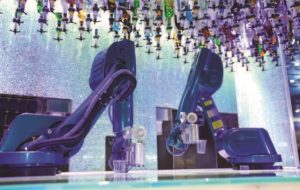 For complicated ethical and psychological reasons, people will continue to prefer being lied to and killed by other people rather than by androids. And there will always be a high demand for unique, hand-crafted beautiful things with charming imperfections, such as Michelin 3-star dinners, Patek Philippe watches, Tiffany engagement rings and Lamborghini sports cars. Oh, and also Bartender. Would you really want to go to 21 in New York or Harry’s in Paris and be served a dry and dirty vodka martini or Pimm’s Cup—just the way you like it—by a mechanical arm or silicone-skinned cyborg? Could you imagine Frank Sinatra singing Make it one for my baby and one more for the road to something that looks and walks and talks like a refugee from an auto assembly plant?
For complicated ethical and psychological reasons, people will continue to prefer being lied to and killed by other people rather than by androids. And there will always be a high demand for unique, hand-crafted beautiful things with charming imperfections, such as Michelin 3-star dinners, Patek Philippe watches, Tiffany engagement rings and Lamborghini sports cars. Oh, and also Bartender. Would you really want to go to 21 in New York or Harry’s in Paris and be served a dry and dirty vodka martini or Pimm’s Cup—just the way you like it—by a mechanical arm or silicone-skinned cyborg? Could you imagine Frank Sinatra singing Make it one for my baby and one more for the road to something that looks and walks and talks like a refugee from an auto assembly plant?
2) Outside of the truly high-end professional careers— including medicine, surgery, law, clinical psychotherapy, and rocket science—most of the professions we think of as being mainstream will come to an end, fully superseded by that of the “gig” (aka freelance) economy. In other words, we will be witnessing the last vestiges of the “cap-and-gown to gold watch + pension” economy in the decades to come. The vast majority of today’s newly born will most likely have to live by the old Marine Corps motto:  Improvise, Adapt and Overcome. Or if you prefer: When life gives you lemons, make lemonade. The take-away? Be flexible. Never stop learning. Take earned personal pride in adding more and more tools to your toolbox, and in expanding your potential. Knowledge is power, as Francis Bacon said. Now for the most interesting part. What about the jobs of 2050 that don’t yet exist, or are presently in the prototype or metamorphic stages? Good news! While so many old jobs will disappear, lots of new ones will be created. According to the Institute for the Future (IFTF), 85 percent of them haven’t even yet been invented…which means that tomorrow’s workforce will likely be unrecognizable to us old geezers who hang on for another 30 years. So when your child or grandchild or great-grandchild proudly announces that he or she plans to be something you’ve never heard of, it’s okay to say What? What the heck is that? But be proud, too.
Improvise, Adapt and Overcome. Or if you prefer: When life gives you lemons, make lemonade. The take-away? Be flexible. Never stop learning. Take earned personal pride in adding more and more tools to your toolbox, and in expanding your potential. Knowledge is power, as Francis Bacon said. Now for the most interesting part. What about the jobs of 2050 that don’t yet exist, or are presently in the prototype or metamorphic stages? Good news! While so many old jobs will disappear, lots of new ones will be created. According to the Institute for the Future (IFTF), 85 percent of them haven’t even yet been invented…which means that tomorrow’s workforce will likely be unrecognizable to us old geezers who hang on for another 30 years. So when your child or grandchild or great-grandchild proudly announces that he or she plans to be something you’ve never heard of, it’s okay to say What? What the heck is that? But be proud, too.

Virtual Store Manager
More and more consumers are shopping online, but still seek personal advice and assurance from vendors. In a recent Google survey, 61% of online shoppers reported that they call a business before making online purchases. Producers and retailers will be incentivized to expand and maintain their staff of real salespeople with real sales expertise in their online spaces.
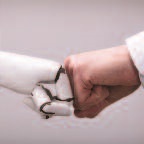
Human-Robot Counselor/AI Therapist
As robots become ever more sophisticated, reliable and cost-effective, they will creatively destroy many muscle-driven jobs in heavy industries, such as mining, auto, and aviation manufacturing, shipbuilding and construction. At the same time, they will also create new jobs for humans as their task- and maintenance-supervisors. As working relationships between robots and humans become the norm, personal conflicts are sure to manifest themselves. Who will address them? Robot-Human Resources Counselors. and AI (Artificial Intelligence) Therapists, of course. Thus will be born an entirely new mental health field, geared to help people adjust to and cooperate with their cybernetic colleagues. Think of Fry and Bender on Futurama.

Algorithm Programmer/Robot Trainer
Software and firmware algorithms enable computers to perform sophisticated interactive tasks (i.e. Alexa or Siri). Today, only a small number of elite programmers are capable of writing those algorithms. But over the next decade or two, it’s a good bet that their now-rare skills will become standardized and commoditized—and assumed by mid-level or entry-level employees. Remember, not so long ago, when a working knowledge of Word, Excel, and PowerPoint was a cutting-edge advantage in the job market?
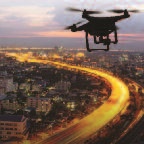
Drone Air Traffic Controller
In 2016, almost 700,000 aerial drones were registered with the federal government. Amazon and Google are actively beta testing delivery of goods by aerial drones, and future drone pilots are already attending specialty technical schools. Three decades from now, millions of drones will fill the skies and will need to be monitored by an air traffic control network similar to that for passenger airplanes. If you’re a glutton for punishment and high stress, this just might be your dream job. I can’t help picturing Lloyd Bridges in Airplane.
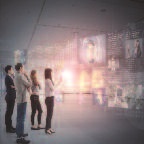
Micro Gig Agent
More and more agents, reps and consultants will be needed as independent contractors as tomorrow’s freelance economy grows. Just like today’s talent and professional services agents, “Micro Gig Agents” will work on commission or retainer, finding and matching goods and/or services offered by their clients to the everchanging demands of potential customers and/or employers.
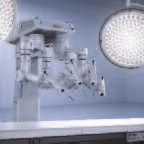
Robotic Surgeons & Surgical Technicians
Precision surgeries are now being performed using multi-armed robots, such as the da Vinci system at Trinitas. Articulated arms are fitted with instruments, providing virtually unlimited degrees of motion and precision, while another holds a high-definition 3D camera to assist the surgical team and minimize error. As more and more medicine is practiced remotely—and as more sophisticated surgeries are executed robotically—robotic surgeons and their supporting technicians will need to possess both the knowledge of traditional physicians and surgeons and technical proficiency with their new high-technology equipment.

Organ Transplant Engineer
In the United States, dozens of people die every day waiting for transplants that can’t take place, primarily due to the shortage of compatible donated organs. Last February, scientists at the University of California, Davis successfully cultured sheep embryos containing human cells—a major step forward to the goal of growing complete human organs inside animal hosts. Xenotransplantation will eventually be the primary source of transplant materials, designed and engineered to ensure 100% effectiveness and 0% probability of autoimmune rejection. Engineers of xenotransplant organs will occupy a critical role in future medicine.
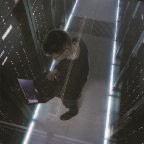
Cyber Security Specialist
Given the relentlessly increasing number of security breaches of both government and private corporate networks, more and more cybersecurity experts will be sought to counter future threats to the online universe that we love and depend on. Calling all keyboard warriors! How cool would it be to work for the CIA (or PayPal), catching truly bad guys?

Security/Police Officer
Security and police officers have existed pretty much since ancient Babylon. In the near future, they’ll no longer need to pull long hours at the station house or cruising streets in a squad car, as they’ll be able to respond even faster and more effectively with robot “muscle” backup— advanced audiovisual surveillance capabilities, and airborne vehicles.

Space Tourism Guide
We’ve been waiting for it since 2001: A Space Odyssey, but at last, space travel and tourism for the common man are drawing closer and closer to realization. By 2050, a trip to a space station or even the moon will most likely be as common as a business junket to Cincinnati or a family holiday to Orlando. Those working to make their passengers comfortable with these probabilities will require strong people skills, similar to those of current air flight attendants, such as knowledge of safety procedures and resistance to motion sickness and vertigo.
Augmented/Virtual Reality Designer/Engineer/Architect
Marketing and retail companies are already actively seeking augmented/virtual reality designers, engineers and architects to create interactive, immersive experiences for their consumers. Those with expertise in AVR technology—combining computer-generated images with physical environments— will be hot prospects in the job market, conceiving and creating for everything from job training to outdoor advertising to (one day) Star Trek “holodeck” experiences.

Automated Construction Specialist/Architectural Engineer
Using innovations like 3D modeling/ printing and advanced robotics, architectural engineering and construction in the future will be nothing short of revolutionary. Specialists in these fields will be equipped to build human habitats straight out of science fiction. Imagine apartment buildings perched thousands of feet in the sky like the Jetsons’, mobile floating “sea stead” towns in the oceans or subterranean Logan’s Run-esque cities.

Data Analyst/Future Forecaster
For a hundred years or more, since the founding of IBM or maybe since the Age of Enlightenment, analysts of empirical data have been instrumental in advancing humanity’s understanding of itself. And they will continue to do so. They are the high priests of our culture, producing the charts and graphs that explain the present and predict the future. Where have we been? Where are we now? Where are we going? Will stock and bond prices soar or plummet? Will we run out of fresh produce, water, petroleum or gummi bears? Will there a war? Don’t ask me…call your analyst.

Genetic Counselor
The term “designer baby” isn’t anything new. Genetic and genomic scientists are already able to detect many inherited abnormalities that may jeopardize a child’s health or quality of life. Doctors and scientists generate the raw information, but genetic counselors will be needed to help parents make the best choices for themselves and their posterity. About 2,000 professionals are currently recognized by the American Board of Genetic Counseling. Look for that number to skyrocket as we learn more about ourselves at the molecular level.

Transportation Engineer
Autonomous personal aircraft, pneumaticintercontinental trains, maglev monorails, moving sidewalks—science fiction novels, movies and television programs (as well as magazines like Popular Mechanics) have dangled images of such futuristic vehicles before our starry eyes for decades. We are still fascinated by their possible realization. Transportation engineers will be the ones to make them happen. Most of us spend more waking hours working than with our families and friends. So, if I may argue, matching our personal strengths and aptitudes to our interests and passions, and choosing wisely what we work at (whether a profession, vocation, occupation or trade) is the most important existential decision any of us make in our lives. If what we do is indeed a big part of who we are, then the best advice we can offer to the young workers of 2050 is aspire to do what you love, and love what you do. In closing, I also think it’s worth considering the words of Saint Jerome: fac et aliquid operis, ut semper te diabolus inveniat occupatum. “Engage in some occupation, so that the devil may always find you busy.” In other words, if you sit around doing nothing, you’ll be more tempted to do questionable things. For those who love to do and make things, the world of 2050 should be a moveable feast of possibilities. If so, sit down to the table and order up.
Positive Deflation: Can It Happen?
As productivity increases by way of automation, material scarcity decreases. That means less and less of us will be needed to work at producing the materials for basic human survival, such as food, clothing, housing, energy, and transportation. These commodities will become so abundant that their prices will plummet…which means that everyone will be able to consume them for less and less money. Working simply to earn enough money to purchase them might soon be practically unnecessary. Economists call this Positive Deflation. Difficult as it may be to imagine today, in 2050 the goal of “freedom from want” may be achievable—and a fact of life for many of us. People will be empowered to pursue their unique individual talents and creative passions in the Brave New Economy liberated for the first time in human history from the fear of privation.
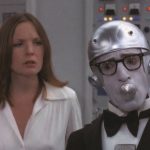
Recommended Reading (and Viewing)
If you’re interested in wrapping your mind around the twists, turns and unintended consequences of the future, I highly recommend immersing yourself in the work of some highly imaginative people who have already done a deep dive…
Sleeper • Woody Allen
I, Robot • Isaac Asimov
I Sing the Body Electric • Ray Bradbury
Fantasia/The Sorcerer’s Apprentice • Walt Disney
Futurama • Matt Groenig
Brave New World • Aldous Huxley
The Stepford Wives • Ira Levin
Player Piano • Kurt Vonnegut





